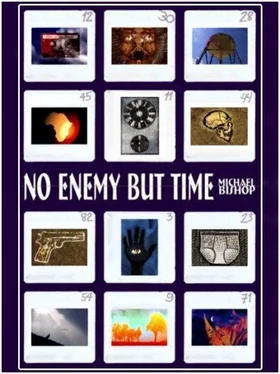Time, as it always does, passed.
On the fifteenth anniversary of my return from my stay among the habilines (the very date in August that Monicah, a.k.a. the Grub, had at the ripe old age of six chosen as her “official birthday”), I took my daughter to the spanking-new Sambusai Sands Convention and Recreational Centre on the shores of scenic Lake Kiboko. This was my birthday gift to her. She would soon be off to the States to resume her education at a private school in Kent, Connecticut, and I was hoping that a few days of paddleboating, Ping-Pong, shuffleboard, swimming, crocodile watching, and casino games would erase her melancholy mood.
Although White Sphinx had long ago purged me of my spirit-traveling episodes, I knew what Monicah was suffering. She dreamed as I had once dreamed. Not of her mother’s cat-eat-chalicothere grasslands, however, but of a vivid utopian tomorrow whose inaccessibility sometimes frustrated her beyond bearing.
I, the past; she, the future. By nature Monicah was a cheerful child, whom both Jeannette and Anna had come to know and like, but in the wake of recent sociopolitical catastrophes (from which Zarakal, by means of a friendship treaty with the Pan-Arabian League and a strong leadership role in the East African Confederation Movement, had partly insulated itself) her dreams had increased in number, duration, and intensity. She was a tormented young woman, my Monicah. If this holiday did not rub the rust from the rose, I could not in good conscience send her off to school in Connecticut.
I had then served in Zarakal’s cabinet for nearly a decade. At thirty-nine I was still the youngest member of the National Assembly with an appointment to the President’s cabinet, and it was one of my duties to be on hand for the gala Grand Opening of the Sambusai Sands Hotel and Cabaret. Not merely by chance, this event coincided with the anniversary of my deliverance from the Pleistocene and with Monicah’s birthday.
My position had its perks. When Monicah and I arrived at the newly completed Alistair Patrick Blair Airport, a group of Sambusai ilmoran , or warriors, met our private jet and escorted us into the terminal—where two of their number, apparently the winners of a lot drawing, attached themselves to us as additional bodyguards. Imposing in their ceremonial cloaks and ornate beaded headbands, they were soft-spoken fellows who had attended a Catholic mission school at a nearby frontier outpost. They towered over my daughter and me.
Monicah, despite my protests in Marakoi, had shaved her head and donned elegant African garb as (her own words, I swear) “prophylactics against the corrupting influence of the resort.” Now she would have to wear a wig to her classes at Kent School. Our Sambusai bodyguards did not mind. They turned their deep brown eyes on Monicah with respectful admiration. Good. I had begun to fear that all my plans on her behalf were going to be thwarted by her own intransigent attitude. Maybe the casual closeness of a pair of innocently virile males would improve her disposition. I sent her down to the paddleboat marina with the Sambusai warriors and one well-armed security agent while my aide and I checked in at the hotel’s main desk and rode upstairs to scrutinize our V.I.P. suite.
“Very WaBenzi.”
“Yes, sir,” agreed Timothy Njeri, a fiftyish Kikembu assigned to me not long after I had won my seat in the National Assembly. Timothy’s briefcase contained sophisticated electronic gear, which he immediately deployed to scan the room for listening devices. “It seems to be quite clean,” he said at last, carefully packing his equipment away.
I told Tim to fix himself a drink from the suite’s well-stocked bar. Then I eased myself into an Agosto Caizzi fishnet pullover and a pair of designer bush shorts and descended to the Sands lobby to fulfill another of my obligations on this multipurpose mission.
One-armed bandits whirred and rang in the gaming room to my right, while in the left-hand casino a dozen roulette wheels ratcheted through their fateful orbits. There were more Americans than ever in Zarakal, and the Air Force, in response to our treaty-extension stipulations, had just inaugurated free shuttles from Russell-Tharaka and the naval facility at Bravanumbi for all eligible military personnel.
Further, an American coffee concern had built a company town in the central highlands, and there was a Ford suncar plant on the outskirts of the capital, where Zarakali laborers pocketed four times the average hourly wage of other native workers but only a third of what their American counterparts in Dearborn and Detroit were making. In spite of the continuing drought in the Northwest Frontier District, our economy was booming. Marakoi’s East African Ledger made occasional mention of my contribution to the boom.
A black man in Western clothes wearing a distinctive scarab tie pin caught my eye and pushed through the smoky revolving doors to the terrace overlooking the lake. The tie pin identified the man as my contact, a liaison between the custodians of the moribund White Sphinx Project and the Zarakali government. For obvious reasons Matthew Gicoru, our Vice President, had selected me to represent our interests in this meeting, but I still did not understand either the need for such a get-together or the liaison’s insistence on these embarrassing James Bond tactics. After ten minutes in the arid lacustrine heat his enameled scarab would melt right down the front of his tie.
I followed the man outside. My contact, after checking to see that I was not being tailed, led me along a palm-lined parapet away from the hotel. It was three o’clock in the afternoon and much too hot for such foolishness. Book-ended between her Sambusai galley slaves beneath a big polka-dot parasol, my Monicah was a passenger in the only paddleboat plying the turquoise waters of the lake. A small rescue vessel stood offshore to rescue any boater who fell victim to the heat.
To the north of the hotel we were building a nine-hole golf course, with Astro-turf fairways and greens, but it was difficult to imagine anyone but a rich Bedouin ever using it. In addition to dehydration and sunstroke, there were other hazards. My contact, jumping down from the retaining-wall promenade, ignored a tall stone obelisk warning of these:
GUESTS PROCEED AT OWN RISK BEYOND THIS POINT.
* * *
Beware of lions and other potentially dangerous wildlife.
Automatic one-year prison term for any unauthorized person bearing firearms into restricted area.
This message, repeated in Swahili, French, and Arabic, bore a replica of my own signature: Minister of Tourism and Intercultural Affairs. It was countersigned by the Interior Minister.
Several dozen yards beyond the obelisk my contact halted on a ridge overlooking the fossil beds where Alistair Patrick Blair had made his reputation as a paleoanthropologist. The heydays of the seventies and eighties were no more. A chain-link fence enclosed the area where the Great Man’s successors labored to keep his work alive in the mocking shadow of the Sambusai Sands Hotel.
I did not like to come out this far, because memories nagged at me here. One of them was commemorated by a bronze sculpture of a hominid skull that turned on a stainless-steel pivot above a cairn of mortared stones. This monument stood in front of the wattle shack that had been Blair’s headquarters at Lake Kiboko. Tourists could enter the protectorate, shrunk from two hundred square miles to a few hundred square yards since the Great Man’s death, only on Sundays, and they were always accompanied by armed guards who did not permit them to wander from a preordained route.
The guards’ pistols were to intimidate the tourists as well as to defend against lions. The plaque on the cairn read:
Читать дальше



![Ally Carter - [Gallagher Girls 01] I'd Tell You I Love You But Then I'd Have to Kill You](/books/262179/ally-carter-gallagher-girls-01-i-d-tell-you-i-lo-thumb.webp)








